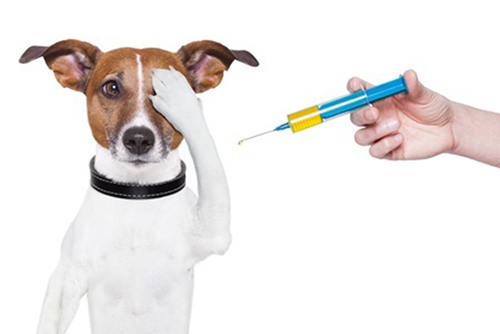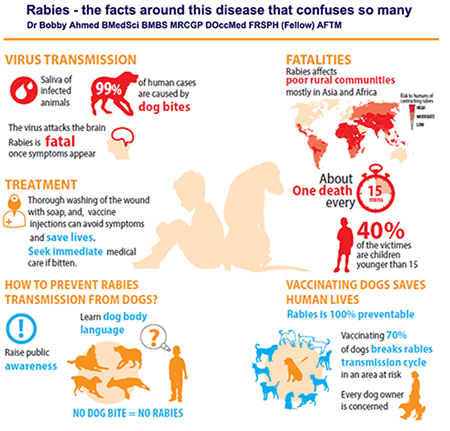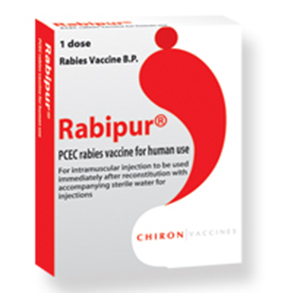Going to Asia, Africa or Latin America?
Rabies vaccination saves lives



Why the pre-exposure rabies vaccine is so important now that the vaccine is in short supply worldwide (October 2023) – by Dr Bobby Ahmed AFTM RCPS (Glasg)
Rabies is the deadliest disease known to man, with a 99.9% fatality rate. Less than a handful of people have ever survived rabies as far as we know.
Pre-exposure vaccination is a highly effective measure in lowering the risk of this disease following a bite or scratch from a suspected rabid animal.
Pre-exposure vaccination does NOT just ‘buy you time’. You will still need to go to the hospital after an exposure but the management of the exposure will be different to someone who is unvaccinated.
No vaccinated person has ever been known to develop the disease as far as we know.
Unvaccinated people may require the human rabies immunoglobulin antidote, called HRIG, however, this is in chronic short supply worldwide.
Each year, around 15-20 million people receive treatment following a suspected rabid exposure. Around 60,000 -100,000 people die of the disease.
The primary course consists of three vaccines given over 3-4 weeks and will never need to be repeated.
Domestic or feral (wild) dogs are the most common source of rabies in humans in Asia, Africa and Latin America. In North America and Europe the disease is mainly confined to wild animals (particularly bats, raccoons, foxes, coyote, and skunks).
You can catch rabies when the saliva of an infected animal is introduced into your body. This is usually through a bite, but there have been occasions when infected saliva has entered the body via a mucous membrane (eyes, nose or mouth), or via a wound or scratch as the result of being licked.
How common is rabies?
According to the World Health Organization (WHO), over three billion people are at risk of catching rabies in at least 150 countries and territories. Every year more than 20 million people worldwide receive treatment after a suspected exposure to rabies, and there are estimated to be around 80,000-100,000 human deaths from rabies annually, most of which occur in Asia and Africa.
Your risk of rabies exposure when travelling depends on the nature of your journey and the types of activities you will be undertaking. Most rabies exposures during travel are from a dog bite.
You might be at particular risk if
You are going to a high risk area.
You live or travel (frequently or for long periods) to countries with a risk of rabies.
You are travelling to remote areas with limited access to medical care, even for a short period of time.
You intend to take part in activities such as cycling and running, which can attract the attention of animals.
You intend to work with animals.
You are simply unlucky and get bitten, scratched or licked.
Prevention before you go
Book an appointment with your nurse or doctor for a pre-travel consultation at least 6 weeks before you are due to travel.
A vaccine is available for travellers who are considered to be at risk of rabies. Your healthcare provider will be able to talk to you about your risk of rabies and any other disease risks in your chosen destination.
Please note that receiving rabies vaccine prior to travel does not eliminate the need for a medical evaluation if you are exposed to a possibly rabid animal during your trip. Urgent medical advice should always be sought following any possible exposure to rabies; additional doses of rabies vaccine may be needed.
You can help to ensure you receive the correct treatment after a possible exposure to rabies by keeping a record of your rabies vaccinations with you at all times whilst you are travelling. It is important to show this to the doctor or nurse treating you after any potential rabies exposure. For future trips booster doses may be recommended, so check with your practice nurse or doctor before travelling overseas.
What if you don’t get vaccinated before travelling?
If you do not have rabies vaccination before travelling, you may need more intensive treatment in the event of a potential exposure to rabies, including a treatment called immunoglobulin (Human rabies immunoglobulin or HRIG), which will be followed by some doses of the rabies vaccine. Rabies immunoglobulin (HRIG) is vital for immediate protection but it can be very hard to obtain in some countries.
Unfortunately in some parts of the world, up to 50% of rabies immunoglobulin (HRIG) and rabies vaccines are thought to be counterfeit or fake.
In such cases you may need to quickly travel to a nearby country or home to the UK for immediate treatment.
What can you do to protect yourself?
Follow the advice below:
Avoid deliberate contact with wild and domestic animals
Do not approach animals or attempt to pick up an unusually tame animal or one that appears unwell
Do not attract stray animals by offering food or by being careless with litter
Be aware that certain activities can attract dogs (e.g. running, cycling)
Be aware that children are at higher risk of rabies as they are less likely to avoid contact with animals or report a lick or bite.
If you are bitten, scratched, or licked on an open wound (such as a cut or a patch of eczema) or mucous membrane (eyes, nose or mouth) you must seek medical attention immediately.
NEVER think that a wound is so small it can’t be a risk. If the skin is broken then the virus may be able to enter.
What should you do if you are exposed to the risk of rabies?
Remember, this is a medical emergency:
Seek medical advice without delay, even if you had the rabies vaccine before you travelled.
Immediately flush the wound with plenty of soap or detergent under running tap water for at least 15 minutes.
Do not scrub the wound
If possible apply an iodine solution/ neat alcohol (40-70%).
Do not cover the wound or apply a pressure dressing.
Wash any animal saliva from your face immediately with plenty of water to stop it from getting into your eyes, nose or mouth.
Seek urgent medical attention without delay, even if you have had a course of rabies vaccine previously.
You might also need antibiotics to prevent the wound from becoming infected.
Further information for travellers regarding rabies is available from the UK Health Security Agency (UKHSA)
